What we’ve learned from the dogs that visit us daily
When we bought the land for the ranch about 15 years ago, even before we began construction nine months later, a motley welcome wagon of “campo dogs” began coming to visit and indeed never left. Their numbers varied and sure, at first this bony, flea-bitten bunch was just looking for food, and we only encouraged their pathetic entreaties with servings of food and water, and later visits to the vet if one showed up injured, or for spaying and neutering of any we could get our hands on.
By now, we are buying at least two 25-kg. bags of dry dog food a month, supplemented with back and head scratches and dog biscuits at mealtime. It’s quite the routine: When we approach the ranch we can count on greetings by two, three, sometimes five or six mutts that pop out the bushes rain or shine, sometimes at the sound of the car approaching or Stew yelling “Brenda!”, a female that was an early and long-gone member of the gang, and whose name became shorthand for “come and get it!” at feeding time each morning.
We’d give names to returning members of the cast—the siblings Melania and Trumpito, Chucha, Negro, Arno, Malcolm, Poochito, Benji, to name a few I can remember—and inevitably become attached to some and grieve when one day they disappear. After a while, though, you realize that Thomas Hobbes’s dismal description of human existence as “nasty, brutish and short” is also a good fit for lives of stray dogs in the campo.
Trumpito still comes around, but Melania, which we had sterilized, disappeared; Negro was poisoned; Poochito, a small black dog so jolly and bouncy he seemed to jump around on pogo sticks, one day didn’t show up for the morning feeding and never came back. We named him after a dog we had in Chicago and we still miss him. Indeed the majority of our canine visitors eventually vanish, reasons unknown. Félix one day found his beloved Chupitos disemboweled, a horrible sight that made him, presumably a macho Mexican guy, choke up and shed a tear or two.
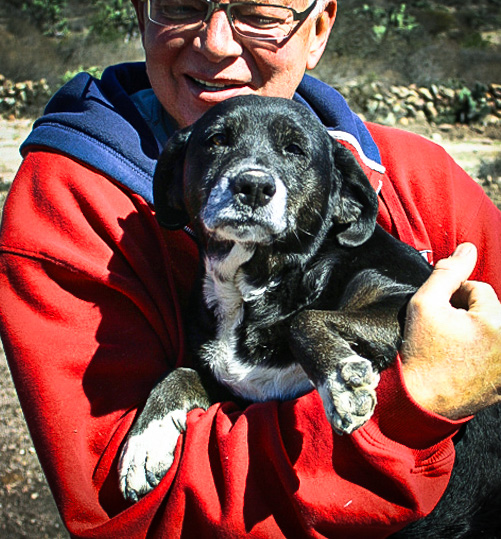
Chucha: Affection central
Out of the ever-revolving cast of dogs that show up at the gate, some become stars because of their antics and personalities. Chucha came to the ranch as soon as we broke ground and she decided Rancho Santa Clara would be the retirement home she’d been looking for. She was mostly toothless, eyes half-shut by cataracts, and her gait wobbly from arthritis, but what she lacked in looks or elegance she more than made up in affection. Chucha hanged around during the nine months of construction, rain or shine, food or no, and greeted us with a thunderous welcome whenever she saw us, as if we were the best thing that ever happened to her—which in fact we probably were.
But like a comfortably old but wheezy old car, constantly in need of tune-ups, fixes and what-not, Chucha was high-maintenance. Her teats were woefully distended probably from countless litters, so we had her spayed. Then she developed what I believe was a tumor in one or two of her teats which had to be removed, plus something to do with a prolapsed uterus. One thing after another, but her unquestioning affection made the medical expenses all worth it. She was a poster of unconditional love.

Unfortunately, Chucha didn’t get along with our other dogs. Perhaps because she appeared so feeble they picked on her and we thought she could be seriously injured. So we kept her on the outside of the gate.
Then one day, sometime in 2012, she seemed particularly frail, almost unable to walk, and we wrapped her in a blanket put her on one corner of the terrace, until the next day when we could bring her to the vet.
She didn’t survive the night. The following day, probably five years after we met her, we buried her in one corner of the ranch, in a pet cemetery of sorts that by now has ten or twelve other graves marked by a small slates of cantera stone with lettering courtesy of Félix.
Benji: Master navigator
When he showed up at the ranch, five or six years ago, we got everything wrong about Benji. He looked like a pure-bred of sorts, so we named him Benji, a larger version of the lead in a 2008 movie. After a few days he displayed what we thought was a most unusual skill: Did Benji understand English? One of us would call out “Sit!”, “Shake paw!” or “Come!” and he seemed to obey. Her language skills plus classy pedigree led us to conclude she must have belonged to an American or Canadian who had dumped her.
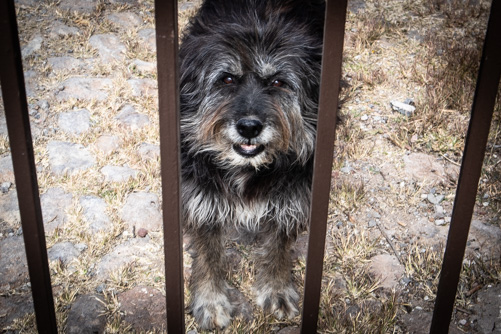
Too high-class to hang around with the hoi polloi by the gate, we figured, so we mounted a campaign to get him adopted. So off to the vet he went for a check-up, a bath and grooming (which revealed Benji was a female) followed by an advertising campaign, including on the local expat internet bulletin board. Within days we got a call from a potential adopter, an American who lived in the Centro and had lost a dog who looked just like Benji.
We met him at a parking lot in town, he fell in love with Benji, now Benjamina, and off they went. That happy ending, though, didn’t last long.
Within three hours after moving into the backyard of her new home, Benjamina escaped through a hole in the fence. Another advertising campaign didn’t turn any leads. We commiserated with the new owner and figured she was gone for good.
But twenty-four hours after her escape we spotted her sauntering about a half-mile on the road to our ranch. “Benji?,” I yelled out, and Stew hit the brakes and reversed the truck to check, and indeed it was Benji. We loaded her in the truck, sweet as ever.
How that dog figured her way back to near the ranch—a trek through ten miles of streets, cars, traffic and all sorts of other hazards—remains a mystery, though apparently not an uncommon feat for dogs, and some cats separated from their owners. Is it smell? A built-in radar in the brain? Memory of some sights along the way?
Whatever it was that guided Benjamina, she is back in the neighborhood, and now permanently stationed by the gate, sleeping on a blanket we put out. She’s also totally deaf, so when we drive home and she’s sleeping in the middle of the road one of us has to roust her and give her a couple of biscuits to get her out of the way.
Her fur is matted and recently we tried to grab her and put her on the truck for another trip to the vet for a bath and grooming, but she won’t have any part of that. Apparently she considers this home and is not up for a repeat of her last adventure.
The unsinkable Mr. Malcolm
Of all the canines by the gate, Malcolm is by far the oldest and longest survivor. I asked Felix, and we figured he’s at least ten, maybe twelve years old, most of which he’s spent loitering outside. Small, with fur a dirty shade of orange and a tail tightly wound, you wouldn’t confuse Malcolm for any sort of purebred. What he is is street-smart, and not intimidated by any of the other dogs, a spunky attitude that surely has helped him survive, along with sight and hearing that are still one-hundred percent.
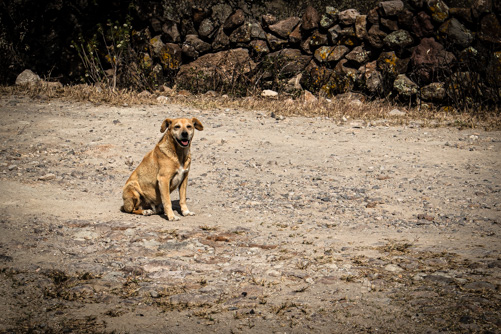
He is undaunted. We used to take our dogs for long walks and Malcolm would join in, invitation not required. One time we walked to visit our neighbor Eleonora, who lives about a mile away, and Malcolm followed and promptly claimed a seat on the circle of patio chairs reserved for the human guests.
We’ve taken Malcolm to the vet a couple of times when he appeared to be limping or somehow sick, but he’s never been treated for anything. He seems to enjoy riding in the truck.
After so many years of hanging around, eating our food and greeting us with an enthusiasm reminiscent of the late Poochito, we have left the gate open a several times and invited him in, but Malcolm is not interested in any indoor domesticity: He’d rather be a free agent, not contained by fences or gates. Indeed he has figured out several entries and exits in the fence that allow him to come and go at will. He’s shown up in the kitchen or in the garage, his quirky tail wagging, but only for brief visits.
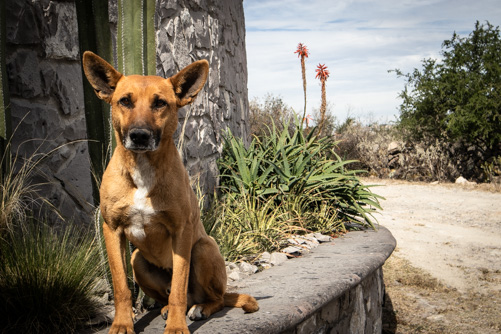
Felix, who has grown fond of Malcolm’s chutzpah, says we should let him stay wherever he wants. No point trying to contain him. “If he stays outside,” Felix says, “he does it out of courtesy not because he can’t come in or leave whenever he wants..”
We are all going to miss that bugger when, inevitably, he fails to show up at the gate for the routine handout. Whenever that happens, we’ll remember Malcolm as a smart mutt who had a long run.
Meanwhile other eager canines wait outside for a chance to get in. A leading candidate is Trumpito, so named because of his orange fur and not, to be sure, because of any other similarity to his namesake. On the contrary, Trumpito is docile, trustworthy, affectionate and seems to get along with other dogs. I’ve also checked with him and he’s assured me he’s a registered Democrat.
That’s a smart pooch.
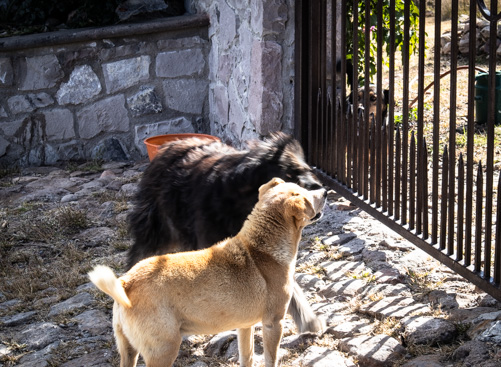
Thank you.
LikeLike
Nice essay-go to the front of the class.
LikeLike
I will meet you there.
LikeLike
You guys are saints for the care and compassion you show to these animals. It demonstrates what level of giving you share with the world around you.
LikeLike
Do we get canonized?
LikeLike
Canonized and Sanitized!
LikeLike
Awww, such a heartwarming story, Al. Loved it, well done.
LikeLike
You have provided these guys with the best life they could have given their circumstances.Thank you for caring
LikeLike
That’s what Stew keeps saying and I tend to agree. Thank you for your comment.
LikeLike
Glad to warm yours and anybody else’s heart!
LikeLike
A very cute piece on your long line of process.
LikeLike